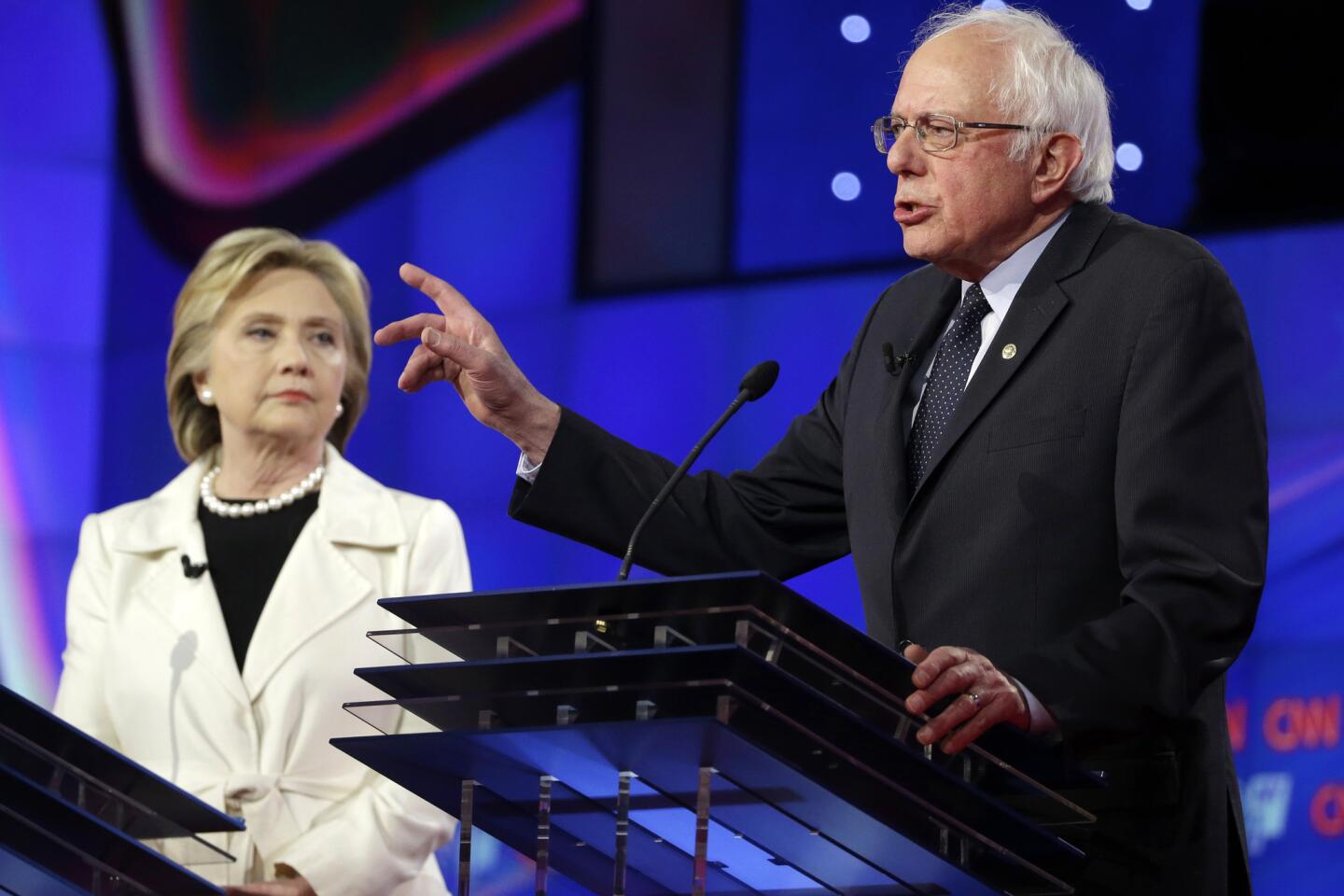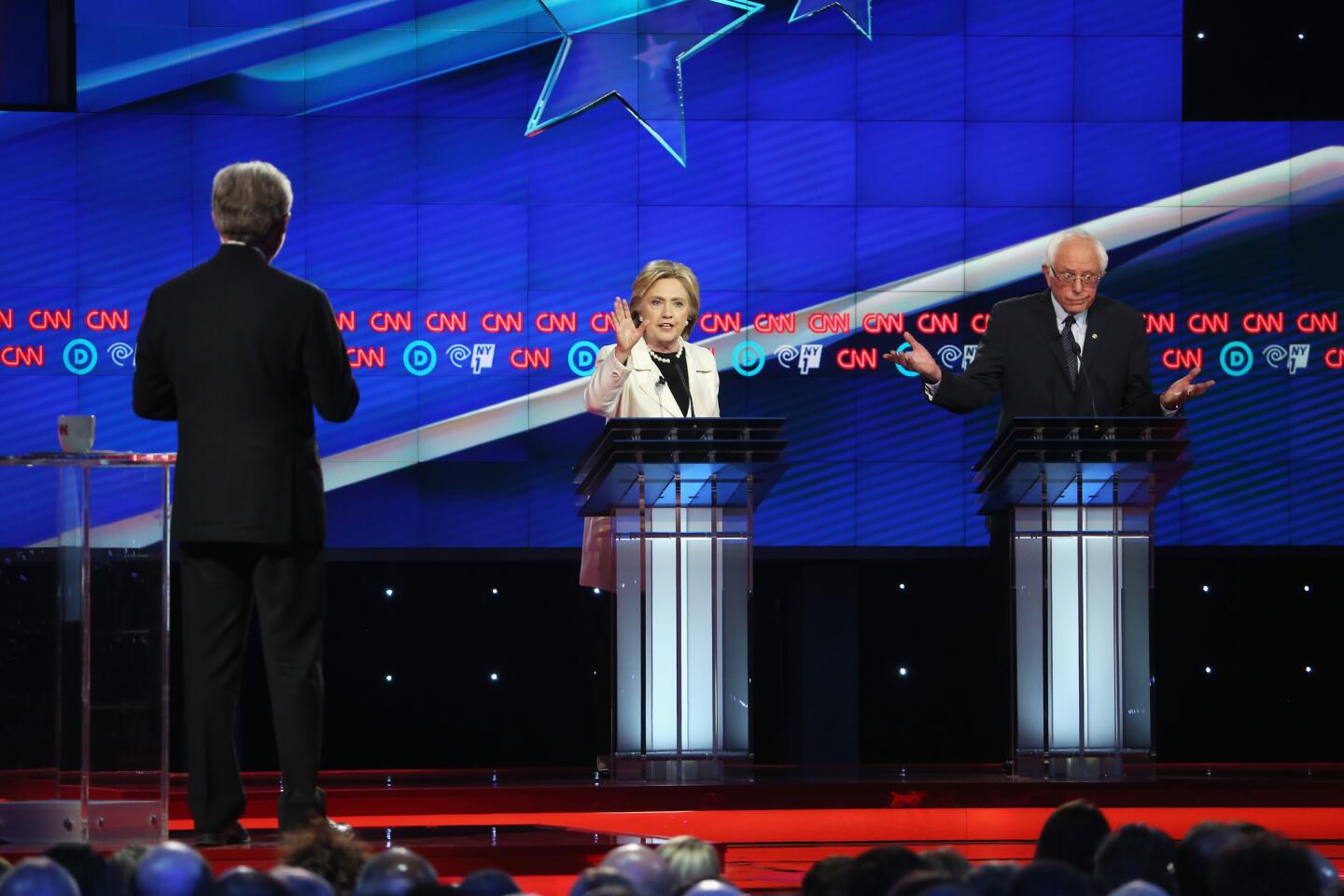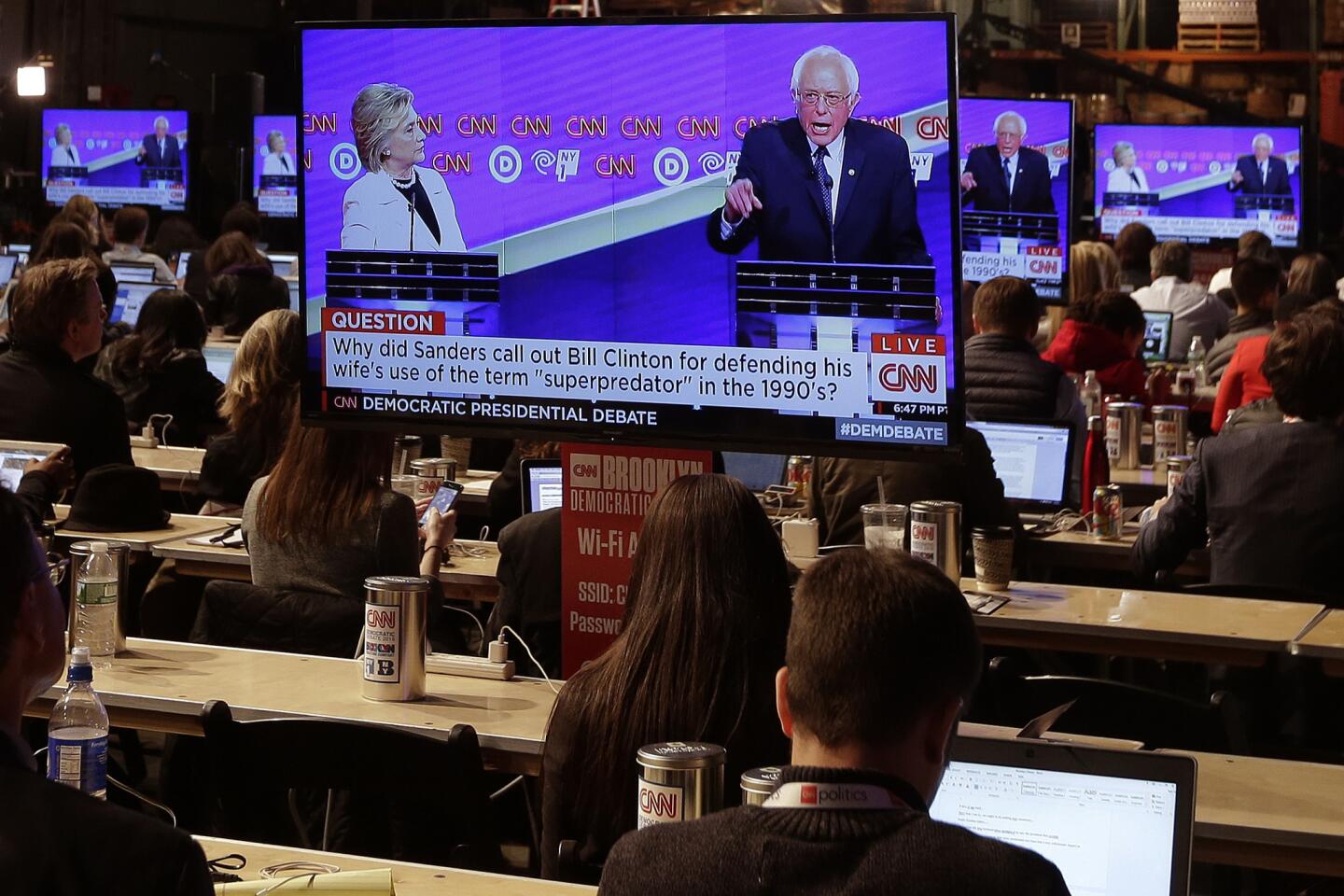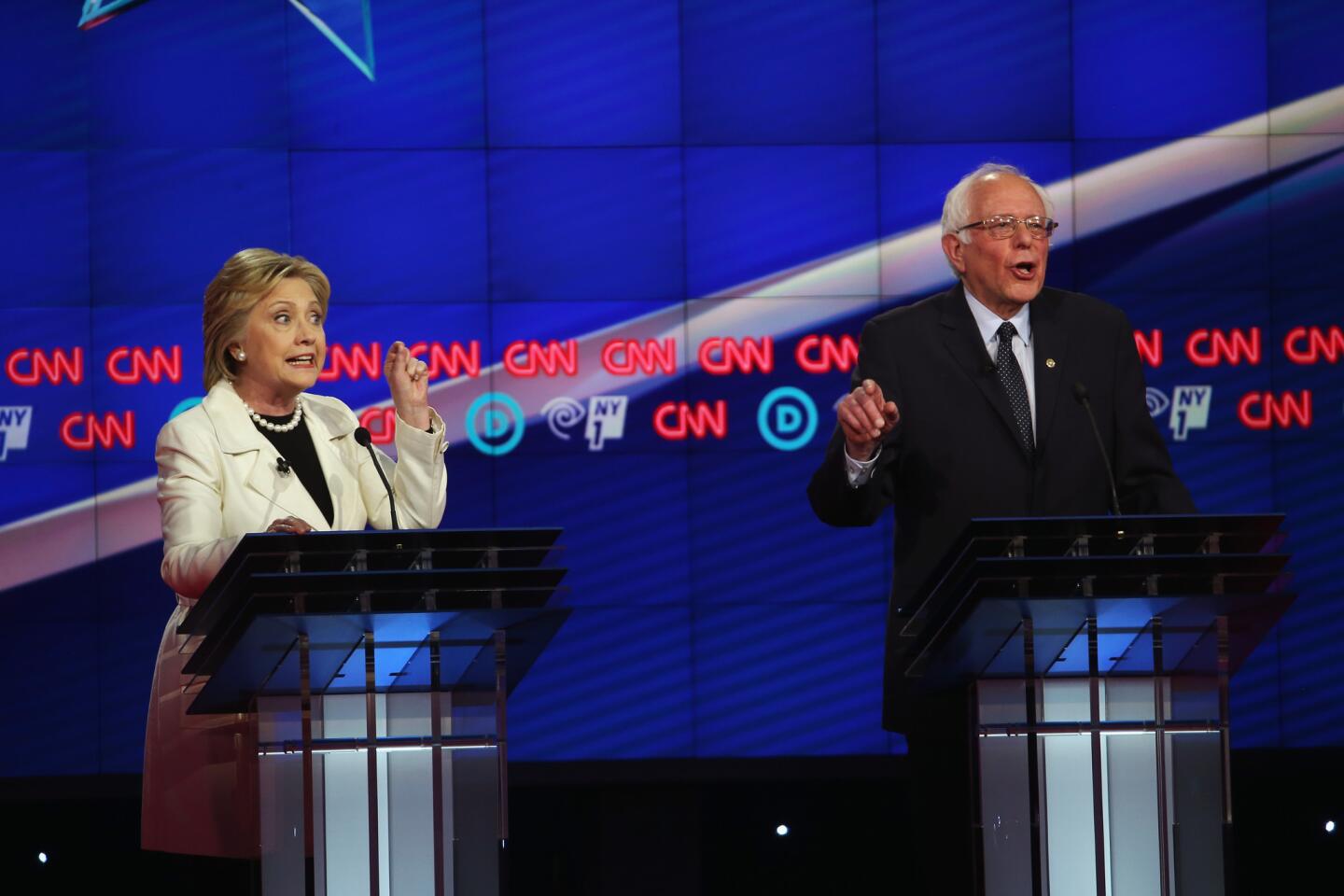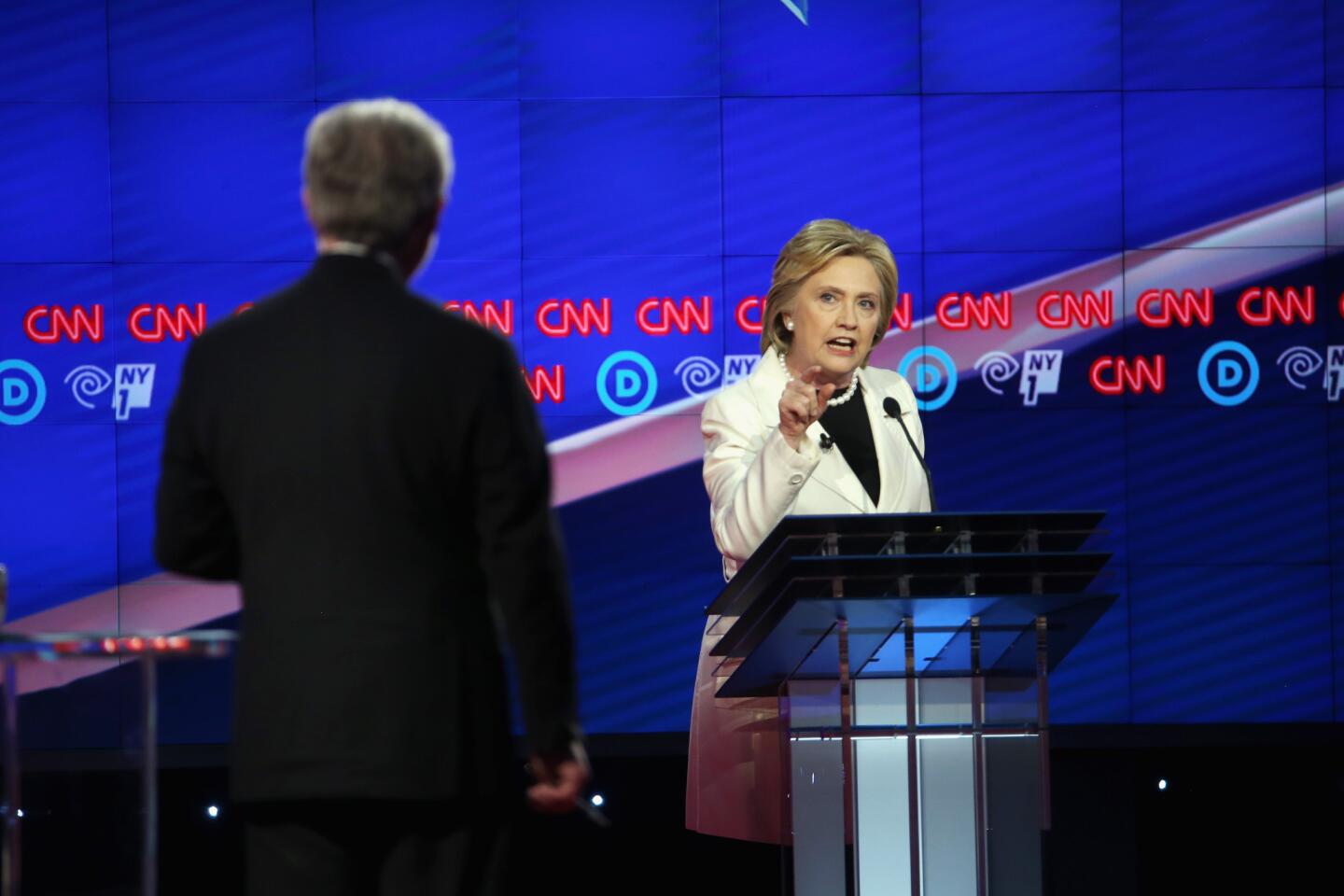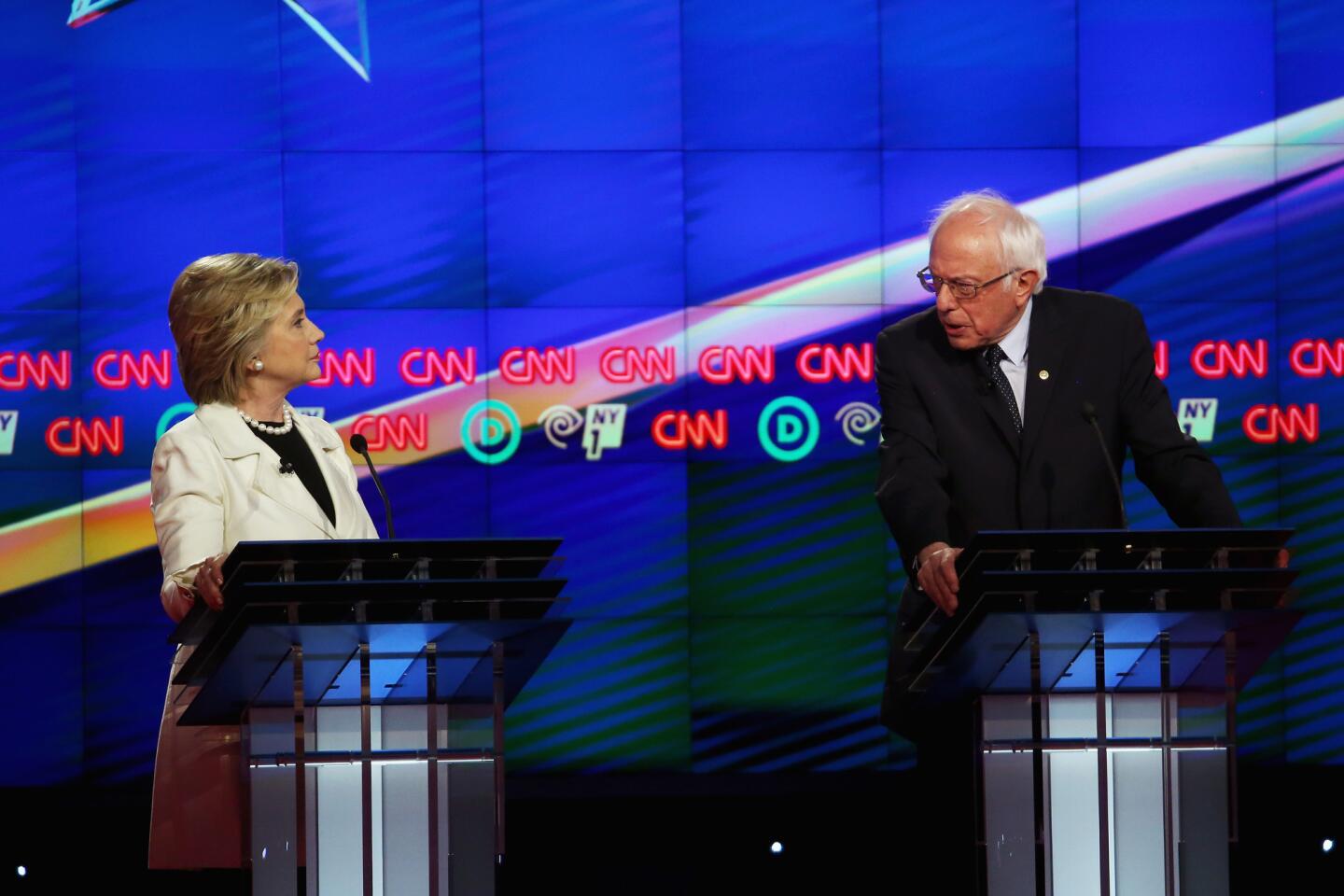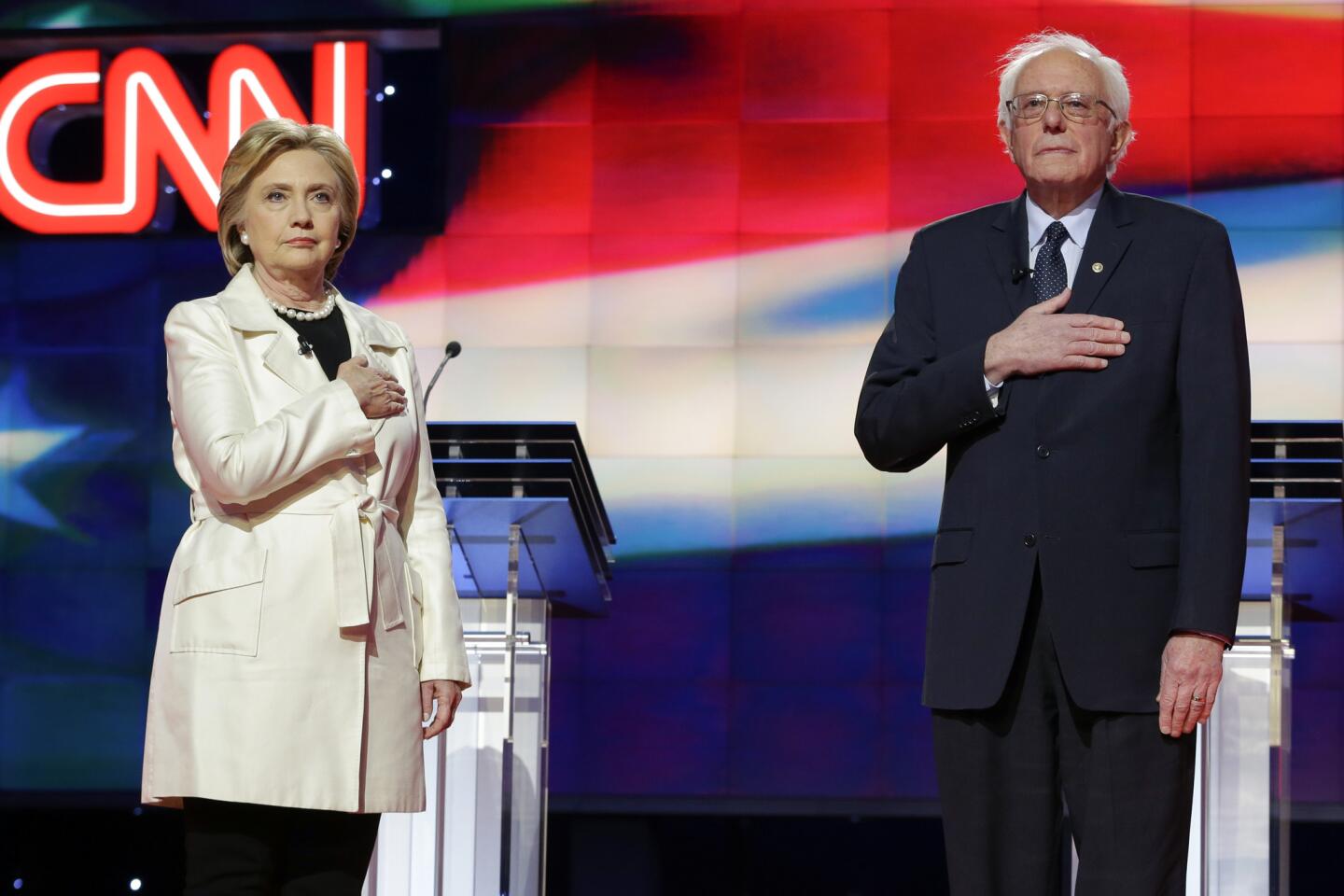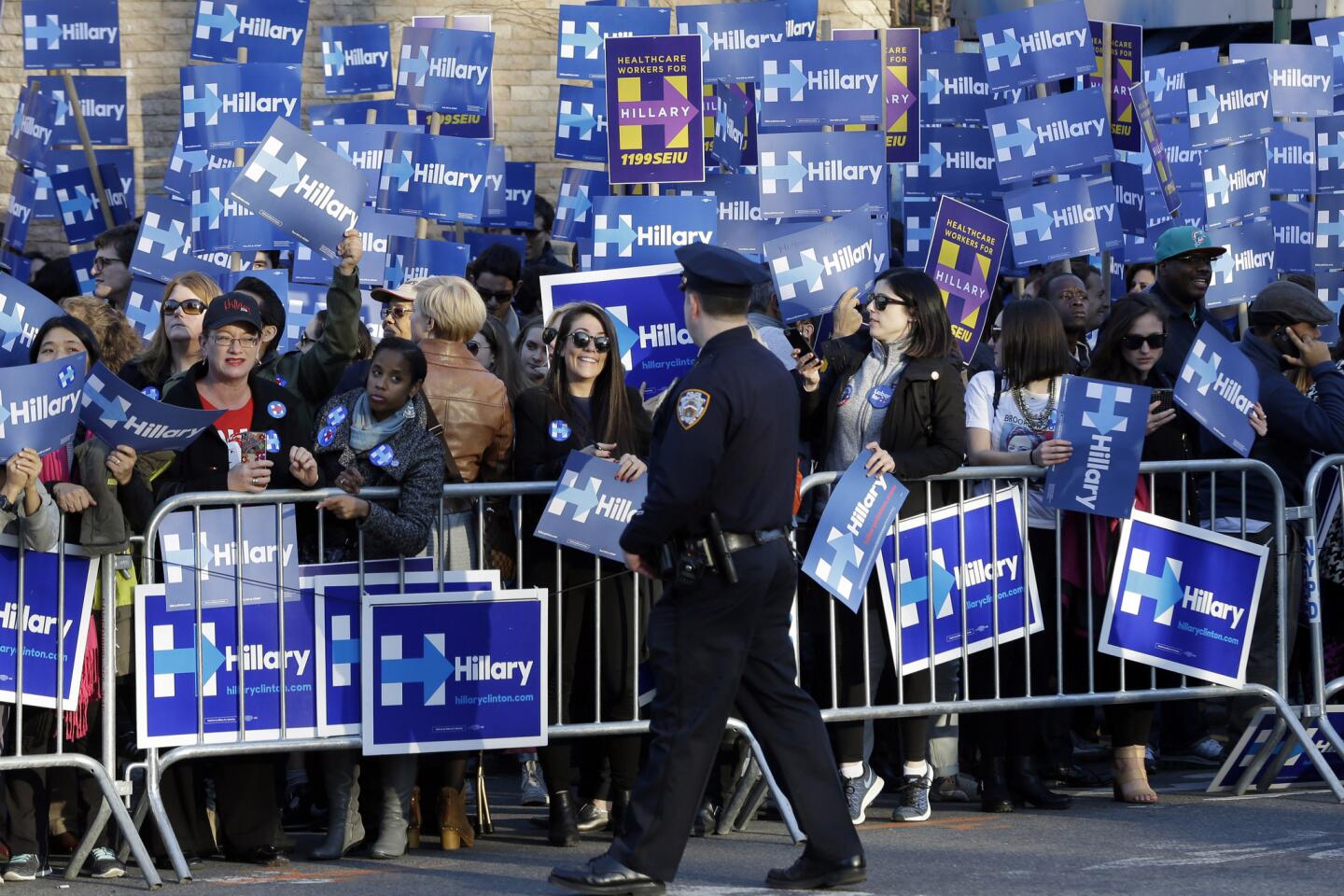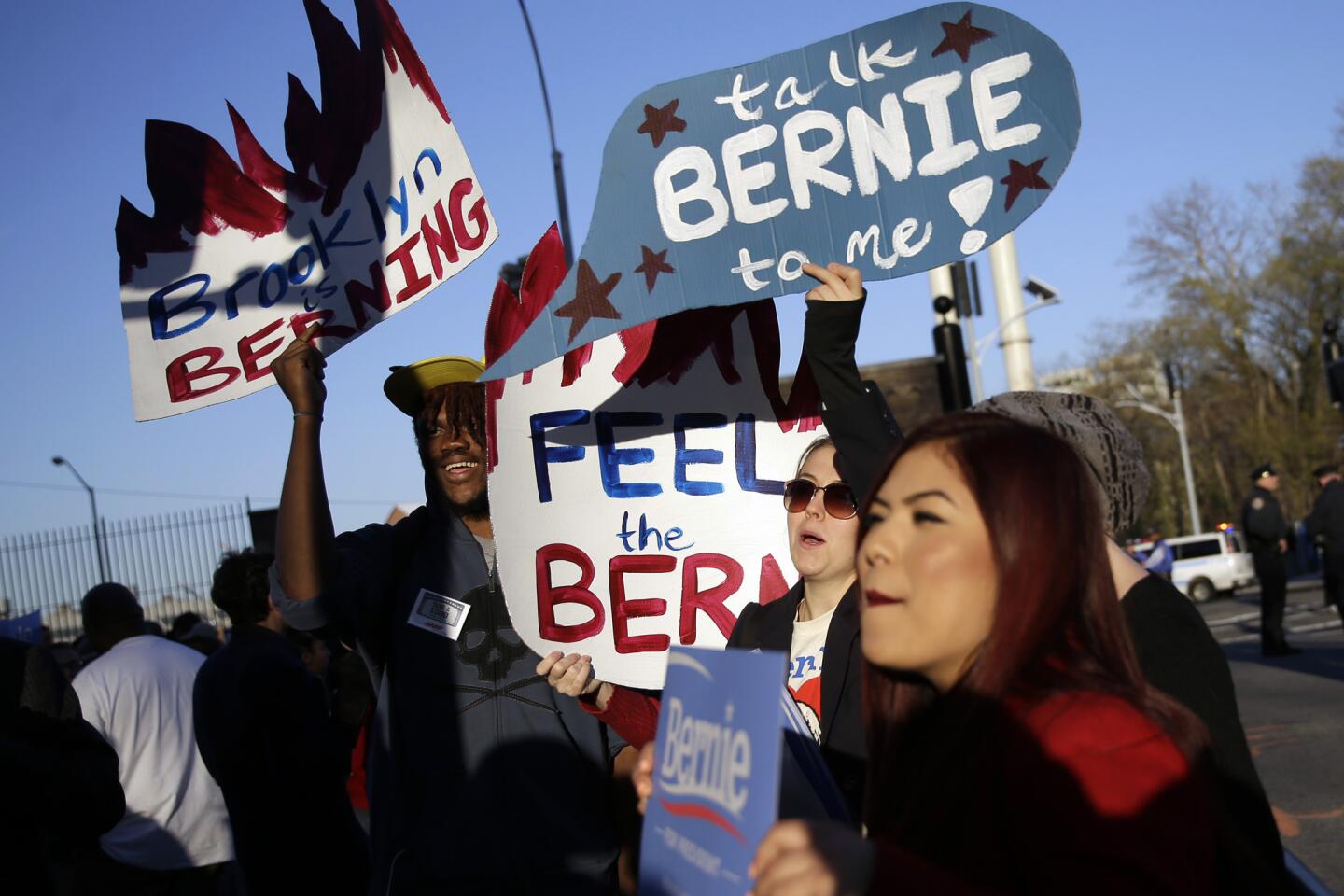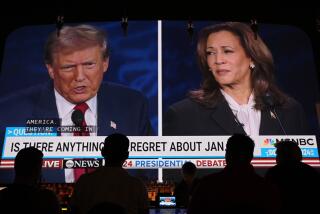Democratic hopefuls go on the attack in Brooklyn ahead of crucial New York primary
Reporting from New York â Sen. Bernie Sanders was anxious to land some tough blows during a debate against Hillary Clinton in his native Brooklyn on Thursday night as he strove for an upset victory over a front-runner whose roots in the crucial electoral state also run deep, but Hillary Clinton came to the matchup prepared.
Their intense sparring underscored the unwillingness of either candidate to yield an inch, even at a time Clinton has pulled far ahead of Sanders in convention delegates. Many seasoned strategists have declared her risk of losing to be almost nil, but Clinton nonetheless cannot afford a setback in New York, the biggest prize in the Democratic contest to date.
A victory here, where polls have consistently shown her well ahead, would put her on a path toward cruising to the nomination, but a loss would generate a fresh round of second-guessing about her abilities as a candidate.
So the two clashed repeatedly during the debate, held at the Brooklyn Navy Yard, amplifying the heated rhetoric they had aimed at each other in the days leading up to the contest â some of the most bitter of the campaign to date.
Early in the debate, Sanders suggested he regretted saying earlier this month that Clinton was not qualified to be president, but almost immediately, he went on to question her fitness.
âI do question her judgment,â Sanders said. âI question a judgment which voted for the war in Iraq, the worst foreign policy blunder in the history of this country, voted for virtually every disastrous trade agreement which cost us millions of decent-paying jobs. And I question her judgment about running super PACs, which are collecting tens of millions of dollars from special interests, including $15million from Wall Street.â
Clinton hit back, once again bringing up Sandersâ struggle to respond to questions about his proposals during an interview earlier this month by the editorial board of the New York Daily News. The Vermont senator had bungled his effort to explain how he would carry out his plan to break up big banks and bobbled other questions about his policy vision.
âIâve been called a lot of things in my life,â Clinton said of Sandersâ âunqualifiedâ comment. âThat was a first.â
âTalk about judgment,â she said. On âeven his core issue, breaking up the banks, when asked, he could not explain how that would be done, and when asked about a number of foreign policy issues, he could not answer about Afghanistan, about Israel, about counter-terrorism, except to say if heâd had some paper in front of him, maybe he could.â
As Clinton has often done in the race, she used President Obama as a shield against Sandersâ implications of untoward influence from campaign donors.
âMake no mistake about it: This is not just an attack on me; itâs an attack on President Obama,â she said, noting Obama had also benefited from a super PAC in his campaigns but had still enacted new regulations on Wall Street.
Sanders repeatedly returned to the financial help Clinton had received from the industry, scornfully suggesting that while he was drafting legislation to break up big banks in the Senate, âSecretary Clinton was busy giving speeches to Goldman Sachs for $225,000 a speech.â
Clinton sought to deflect Sandersâ repeated demand that she release transcripts of such speeches by questioning why Sanders had not yet released his tax returns, something she said was a more conventional act of disclosure for presidential hopefuls.
Sanders said he would release the first of several years of tax returns Friday. Asked why he was not releasing more than one year of taxes, he turned to his wife, who was sitting in the audience.
âJane does our taxes,â he explained as his wife chuckled along from the audience. âWeâve been a little bit busy; youâll excuse us.â
Since the Democratic candidates last debated more than a month ago in Florida, Clinton has scored victories in key states including Florida, Ohio, Missouri and Arizona, only to see Sanders begin his own winning streak, largely in rural-state caucuses but also in Wisconsinâs primary on April 5.
New York, which will award 291 delegates proportionally Tuesday, offers Clinton her latest, best chance to put the nomination out of Sandersâ reach â if not mathematically, at least in the eyes of many Democratic voters and leaders.
Polls by several organizations show her leading the race by around 12 percentage points, buoyed by 2-1 leads from key voting blocs among the stateâs Democrats, particularly African Americans and Jews. Those two groups together are likely to make up more than a third of the Democratic primary electorate. The candidates engaged in several testy exchanges on issues of concern to those groups.
Sanders, who is Jewish, stood by earlier descriptions of Israelâs response to terrorism in the Gaza Strip as âdisproportionateâ â remarks that had riled some pro-Israel advocates.
He was critical of a 2014 assault by Israel that killed and wounded thousands of Palestinians in Gaza, and said the U.S. needed to be more âevenhandedâ in its approach to the conflict.
Clinton expressed regret for civilian casualties but said Israel did not âinvite rockets raining down on their towns and villages,â adding, âI donât know how you run a country when you are under constant threat.â
Both candidates have stumbled in the state in their outreach to black voters. Clintonâs deep ties with African American activists have been particularly strained at times by her support for anti-crime legislation her husband championed while in the White House, some of the provisions of which she now says were overly harsh.
Her past support for that law got more unwelcome attention when former President Clinton got into a shouting match last week with Black Lives Matters protesters in Pennsylvania, during which he defended his wifeâs use of the term âsuper predatorâ two decades ago in talking about some youthful criminals.
âIt was a racist term, and everybody knew it was a racist term,â Sanders said during the debate.
Hillary Clinton again expressed her regret for supporting the 1994 crime law and talked of the need for âwhite people to recognize that there is systemic racismâ in the justice system.
âI am sorry for the consequences that were unintended and have had a very unfortunate impact on peopleâs lives,â she said, referring to the 1994 anti-crime bill. âThe very first speech I gave in this campaign was about what I would do to reform the criminal justice system and to end the over-mass incarceration.â
Clinton embraced New Yorkâs recent decision to begin phasing in a minimum wage of $15 an hour, but, pressed by Sanders and CNN moderators, acknowledged she has only proposed a nationwide minimum wage of $12. If legislation for a national $15 wage came to her desk as president, she would sign it, she said.
Clinton was the aggressor when the conversation turned to gun control. The debate took place hours after a Connecticut judge issued a key ruling in favor of families of victims of the Sandy Hook shooting in their lawsuit against the manufacturer of a rifle used in the killings.
Sandersâ opposition to holding firearms manufacturers liable, which he repeated in his interview with the Daily News editorial board, has become a political liability for the Vermonter in New York City, where Democratic voters are overwhelmingly in support of gun control. At the debate, he said of the Sandy Hook families, âThey have the right to sue, and I support them and anyone else who wants the right to sue.â
The Daily News skewered him and gave Clinton a fresh line of attack on an issue on which she has been pounding Sanders since early in the race. Gun control is one of the few policy areas on which Clinton has been able to position herself to the left of her socialist opponent, who represents a state where a large proportion of voters place a high value on hunting and gun ownership.
Sanders, Clinton said, has been âlargely a very reliable supporter of the NRAâ while in Congress.
Both candidates can claim home-state connections: Sanders was born and raised in Brooklyn, and Clinton represented the state in the U.S. Senate, owns a home in Chappaqua and has based her campaign here.
Clinton entered the New York contest as the heavy favorite, with endorsements from leading Democrats including Gov. Andrew Cuomo, New York City Mayor Bill de Blasio and most of the stateâs congressional delegation. The state has a demographic profile similar to places where she has scored decisive wins â a large share of black and Latino voters.
Sanders enjoys strong grass-roots support and the backing of the New York Working Families Party, a progressive force in state politics. But because only registered Democrats are eligible to vote Tuesday, some of his most ardent supporters canât cast ballots for him.
Times staff writers Cathleen Decker and Chris Megerian contributed to this report.
Follow @mikememoli and @evanhalper for more 2016 campaign news.
ALSO
CAMPAIGN SHOCKER! New York tabloids still have influence in presidential race
Florida prosecutor drops battery charge against Donald Trumpâs campaign manager
Republicans unintentionally prompted this push to help 8 million immigrants become citizens
More to Read
Get the L.A. Times Politics newsletter
Deeply reported insights into legislation, politics and policy from Sacramento, Washington and beyond. In your inbox three times per week.
You may occasionally receive promotional content from the Los Angeles Times.
